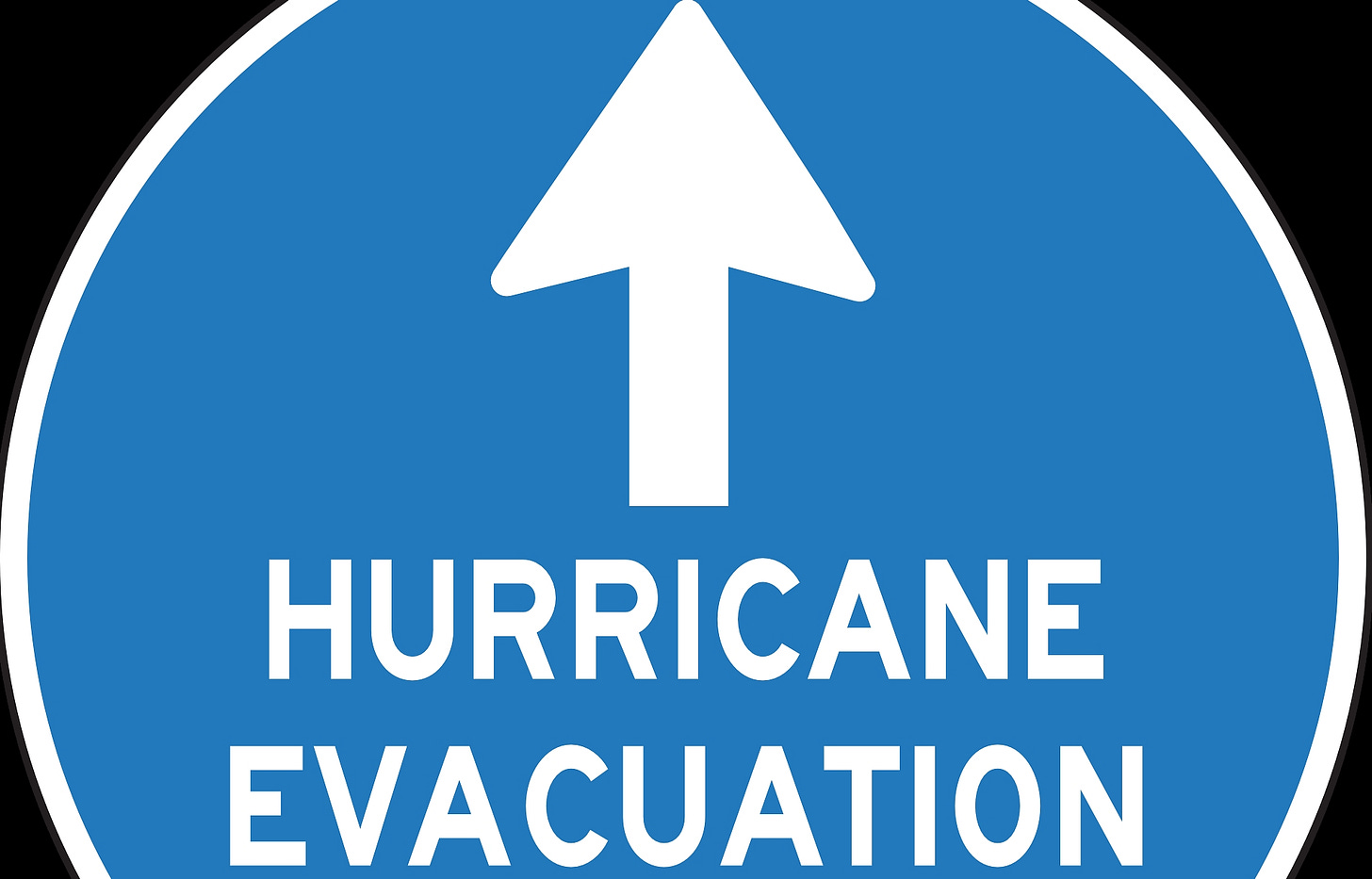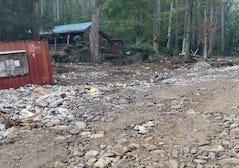After hurricane Helene in North Carolina
What do residents say about allegations against FEMA and authorities?
Hurricane Milton has made landfall in Florida this evening. In North Carolina, hundreds of thousands are still battling the devastation of Hurricane Helene. Did government agencies really fail to provide sufficient disaster relief? I asked some of affected people that I know personally and trust about their experiences.
Hurricane Helene has claimed the lives of at least 230 people across six states. Nearly half of the storm's deaths were in North Carolina. Another 1,000 people are still missing. In the midst of grief, suffering and loss, the Federal Emergency Management Agency (FEMA) faces massive accusations: among other things, FEMA would deny private volunteers access to the disaster area; relief supplies would be held back, and the organization could not provide adequate disaster relief because the money would have been diverted to support illegal immigrants; police officers would threaten private volunteers and homeowners with jail time; and the Biden administration would have denied to deploy the National Guard. Some have gone so far as to claim that aid is being delayed because the government wants to prevent residents, who predominantly lean Republican, from voting on November 5. All accusations have been rejected.
Duke Energy map shows how badly some areas of North Carolina were hit by Helene
Personal report no. 1 - Brevard, Transylvania County, about 50 minutes drive south of Asheville
Some of it is unfortunately true. Mainly in Asheville and Lake Lure areas. FEMA & some knuckhead local officials being idiots.
We’re praying it gets turned around.
We’re not seeing that everywhere though. Northern counties like Madison, Yancey, Mitchell and others, seeing great cooperation and huge success stories.
We were fortunate to not have any property damage. We had backup power and internet, so fortunate there also. Many others were less fortunate, losing power, cell, and internet. Also, many damaged homes and homes completely lost to flooding.
Personal report no. 2 - Pensacola area of Yancey county, almost one hour drive northeast of Asheville
The local population here has done much from clearing roads to getting supplies to the needy. FEMA has done little to nothing except to take over the volunteer fire department, say they are in charge and try to confiscate private donations so they can distribute them. State government seems to be doing OK. Lots of National Guard people here trying to help (that is state, not federal).
We only know our small area which suffered devastation. Our house made it without any damage despite being surrounded by water with a 50 foot WIDE raging river flowing through what had been our yard. Donkeys made it OK. We have a whole house generator, heating sources, water, food, and are doing fine. Returning to “normal” will take a long time, if ever.
Personal report no. 3 - at the county line between Madison and Yancey County, about half an hour drive north of Asheville
I can just give you my observations; as a primary source, my eyes, period.
It is all of whatever you are hearing.
There has never been anything like this for Western North Carolina.
It's worse than anyone could imagine.
Old Mountain Road, our house, is dead center in the worst of it.
You would never know that if you were to visit our house.
Our unique location, with two streams just above us, but our house is tucked into a cove with the mountain we are on. There is at least 500 feet of elevation from the edge of our house to the upper ledge of our hill. We experienced all the rain but were greatly protected from the winds.
We had electricity and internet by 10 pm the day after the storm. Evidence that the gov/utilities are at work. Low-hanging fruit has been first, of course.
My behavior has been dictated by being anonymous and staying out of the way of the folks tasked with coordinating the rescue efforts.
I have witnessed hundreds, if not thousands, of individuals coming out fully prepared to help.
Helicopters pass over the head as if they need a traffic cop. They are bringing emergency supplies: water, food, etc. Every day, the supply chain is very active. And effective.
Fire stations are one of the hubs for distributions. Churches can get supplies from their volunteers and the hub. All the ones you may have seen while here act as dispersed pickup spots for supplies.
Communication is the most significant impediment to coordination.
It is the nature of geography which has created the worst of it. The characteristics of what is known in the Appalachian Mountains - creeks, hollows, hills, and valleys that are not developed because of the difficulty of just putting in simple roadways - make getting help extraordinarily difficult, if not impossible. Motorized vehicles can not get too many of them.
It is not the will or desire lacking, public or private. It is massive in need but impossible to achieve due to the nature of the land and the devastation of roads and bridges.
I still have not been able to get a personal, my own eyes, handle on how terrible and widespread the disaster is. It is much too important to stay out of the way.
All of the reports have some truth to them.
The flaws are emotionally driven.
No one has a complete picture. On the ground, folks simply can not see where they fit in the big picture; they only see the extreme horror of their single acre of purview. The folks at the 40,000 feet perspective can not see the detail the folks on the ground are dealing with.
Imagination, fear, and empathy for the less fortunate fill the voids between the facts.
Buffalo Springfield's lyric explains the scene: "Something's happening here. But what it is ain't exactly clear.. Nobody's right, if everybody's wrong.. carrying signs mostly saying ‘Hurray for our side’.."
Political views behind why it happened, what is being done and who is to blame can not be avoided: human nature.
An appropriate question might be, where do folks get the time and resources to report what little they do see, thus know, and are they capable of reporting without their emotions mixed in?
In this region, a truism is: chop wood, carry water.. that is all that must be done, and the only thing of importance today.
It is being done. Folks with nothing else to do so promulgate the noise and use the wood and water others provide to sustain themselves. Unnecessary overhead, I think.
Detached, unemotional reporters are rare.
1st order hear say I am willing to restate:
Fire Chief: I need to get away for a few minutes to maintain my ability to deal with so many folks wanting to help. I have just dealt with three helicopters and where to put the supplies in the last hour. Yesterday, I was at my real job; it's not even there today.
Burnsville Square Deputy Sheriff: I do not know what is happening now; it is changing quickly. I am on my way, I must walk to the command center to get an update. Set up your Starlink wherever you can. The two networks here are overwhelmed by the number of folks trying to let their family and friends know they are okay. Your network will be really helpful.
Yancey County Emergency Management Chief: don't go to Pensacola to set up your Starlink. The fire chief there reports that he can't get anything done because too many "volunteers" are getting in his way regarding what needs to be done.
My neighbor, JD, First Responder, Professional Fireman, 20 years on the job: It's worse than anybody can imagine. Nothing like this has ever happened in this region of the country. I have been flat out. I am here - at his house, next door to mine, mowing his lawn for therapeutic relief for what he has been doing the past week. We have 90 firefighters from across the country that have come in to man the trucks so we can catch a break. I have not been able to stay home to rest with all that is going on, so I have been doing search and rescue.
JD stated that the storm's rain when it hit the escapement of the Blue Ridge Mountains, the flash flooding that took place wiped out multiple generators of homesteads in the hollers; he has been doing search and rescue in locations that are impossible for regular crews to enter, and has been overwhelmed with the devastation, and alluded to how many people he has found dead from the flash flooding. The speed of the flooding was too fast for residents of home to flee so they died.
JD also said one group that has been, in his eyes, and has been working with during his unofficial rescue activity, is called the Cajun Navy. A group of volunteers that came together during Katrina and has continued since and evolved into a highly sophisticated institution and has set up their headquarters in Burnsville, at the Ross Department Store's parking lot. They have a trailer that costs over $1,000,000 to build as a coordination center. They also have a full-time professional meteorologist on staff in the trailer. It is a totally private volunteer group.
Closing
IMHO, it is a miracle that it is working as well as it is.
Public Institution's strength is their deep pockets and ability to stay present regardless of time-frame.
Private Institution's strength is their ability to be agile with their own bureaucracy so much smaller than the public's bureaucrats; thus, they look much better in the short run.
The are trying to work together - lack of communication systems again being the problem.
Both are vital because of these differences.
I hope you are in a location far away from this turmoil. Believe all you hear, but listen to that still, quiet voice inside and your instincts to separate the facts from emotional bias. Rumor and word of mouth is plentiful. Hard factual news is hard to come by here now.
Local horror story? Not.
A food truck was shut down and told not to provide anyone food until they were reinspected and passed. They didn't pass the inspection when visited.
The local rumor mill tells the story as a bad government intervention stopping private volunteers from doing a good thing. Not.
This food truck was parked in an area with abundant food supplies. Many other outlets were adjacent to this particular truck. All of them were capable of delivering food without the dangers of lack of sanitation. The health inspector, often labeled as the bad guy, was simply doing his job well to prevent potential health crises. All the medical folks needed was to have food poisoning sickness to deal with on top of the current demands they faced.
"If you think education is expensive, try ignorance." Just sayin'.
Ignorance drives, it's excellent for click bait.
At the request of the narrators, I am keeping their names to myself.





